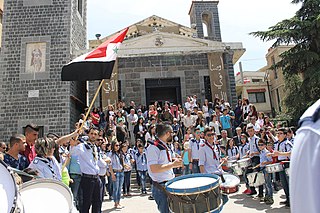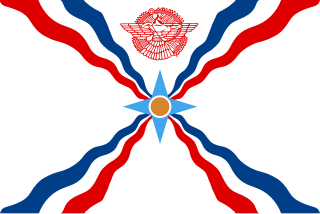Related Research Articles

This is a demography of the population of Lebanon including population density, education level, health of the populace, economic status, religious affiliations and other aspects of the population.

Eastern Christianity comprises Christian traditions and church families that originally developed during classical and late antiquity in the Eastern Mediterranean region or locations further east, south or north. The term does not describe a single communion or religious denomination. Eastern Christianity is a category distinguished from Western Christianity, which is composed of those Christian traditions and churches that originally developed further west.

The World Council of Churches (WCC) is a worldwide Christian inter-church organization founded in 1948 to work for the cause of ecumenism. Its full members today include the Assyrian Church of the East, the Oriental Orthodox Churches, most jurisdictions of the Eastern Orthodox Church, the Union of Utrecht, the Lutheran World Federation, the Anglican Communion, the Mennonite churches, the World Methodist Council, the Baptist World Alliance, the World Communion of Reformed Churches, the Pentecostal churches, the Moravian Church and the Malankara Mar Thoma Syrian Church. Notably, the Catholic Church is not a full member, although it sends delegates who have observer status to meetings.
Full communion is a communion or relationship of full agreement among different Christian denominations or Christian individuals that share certain essential principles of Christian theology. Views vary among denominations on exactly what constitutes full communion, but typically when two or more denominations are in full communion it enables services and celebrations, such as the Eucharist, to be shared among congregants or clergy of any of them with the full approval of each.
An apostolic see is an episcopal see whose foundation is attributed to one or more of the apostles of Jesus or to one of their close associates. In Catholicism, the phrase "The Apostolic See" when capitalized refers specifically to the See of Rome.

Arab Christians are ethnic Arabs, Arab nationals, or Arabic speakers, who follow Christianity. The number of Arab Christians who live in the Middle East was estimated in 2012 to be between 10 and 15 million. Arab Christian communities can be found throughout the Arab world, but are concentrated in the Eastern Mediterranean region of the Levant and Egypt, with smaller communities present throughout the Arabian Peninsula and North Africa.

Syriac Christianity is a branch of Eastern Christianity of which formative theological writings and traditional liturgies are expressed in the Classical Syriac language, a variation of the old Aramaic language. In a wider sense, the term can also refer to Aramaic Christianity in general, thus encompassing all Christian traditions that are based on liturgical uses of the Aramaic language and its variations, both historical and modern.

Alphabetical list of Eastern Christianity-related articles on English Wikipedia

Mar Dinkha IV, born Dinkha Khanania was an Eastern Christian prelate who served as the 120th Catholicos-Patriarch of the Assyrian Church of the East. He was born in the village of Darbandokeh (Derbendoki), Iraq, and led the Church in exile in Chicago for most of his life.

Christianity in Lebanon has a long and continuous history. Biblical scriptures show that Peter and Paul evangelized the Phoenicians, leading to the dawn of the ancient Patriarchate of Antioch. As such, Christianity in Lebanon is as old as Christian faith itself. Christianity spread slowly in Lebanon due to pagans who resisted conversion, but it ultimately spread throughout the country. Even after centuries of living under Muslim Empires, Christianity remains the dominant faith of the Mount Lebanon region and has substantial communities elsewhere.

Christianity in Syria has among the oldest Christian communities on Earth, dating back to the first century AD, and has been described as a "cradle of Christianity". With its roots in the traditions of St. Paul the Apostle and St. Peter the Apostle, Syria quickly became a major center of early Christianity and produced many significant theologians and church leaders. Of the 325 bishops who took part in the First Council of Nicea in 325 AD, twenty were from Syria. Over the centuries, Syrian Christians have played a vital role in shaping Christian thought and practice, contributing to the development of various liturgical traditions, monastic movements, and theological schools. St. Paul the Apostle famously converted to Christianity on the road to Damascus, and Syria has produced three Popes: Pope Anicetus, Pope Sergius I (687-701), and Pope Gregory III. Their legacy includes the establishment of some of the most ancient churches, monasteries, and pilgrimage sites, such as the 5th century remains of the Church of Saint Simeon Stylites, Our Lady of Saidnaya Monastery, and the Cathedral of Constantine and Helen.

Christianity in Kuwait is a minority religion.

Christianity has been, historically, a Middle Eastern religion with its origin in Judaism. Eastern Christianity refers collectively to the Christian traditions and churches which developed in the Middle East, Egypt, Asia Minor, the Far East, Balkans, Eastern Europe, Northeastern Africa and southern India over several centuries of religious antiquity. It is contrasted with Western Christianity, which developed in Western Europe. As a historical definition the term relates to the earliest Christian communities and their long-standing traditions that still exist.

Assyrians in Lebanon, or Assyrian Lebanese, are people of Assyrian descent living in Lebanon. It is estimated that there are approximately 30,000 Assyrians currently residing in Lebanon, primarily in Beirut and Zahlé. This number includes the descendants of Assyrian genocide survivors who fled Iraq, Turkey, and Iran between 1915 and 1934.

Terms for Syriac Christians are endonymic (native) and exonymic (foreign) terms, that are used as designations for Syriac Christians, as adherents of Syriac Christianity. In its widest scope, Syriac Christianity encompass all Christian denominations that follow East Syriac Rite or West Syriac Rite, and thus use Classical Syriac as their main liturgical language. Traditional divisions among Syriac Christians along denominational lines are reflected in the use of various theological and ecclesiological designations, both historical and modern. Specific terms such as: Jacobites, Saint Thomas Syrian Christians, Maronites, Melkites, Nasranis, and Nestorians have been used in reference to distinctive groups and branches of Eastern Christianity, including those of Syriac liturgical and linguistic traditions. Some of those terms are polysemic, and their uses have been a subject of terminological disputes between different communities, and also among scholars.

Assyrian nationalism is a movement of the Assyrian people that advocates for independence or autonomy within the regions they inhabit in northern Iraq, northeastern Syria, northwestern Iran, and southeastern Turkey.

The Arab world consists of the 22 members of the Arab League. As of 2023, the combined population of all the Arab states was around 473 million people.

Christianity, which originated in the Middle East during the 1st century AD, is a significant minority religion within the region, characterized by the diversity of its beliefs and traditions, compared to Christianity in other parts of the Old World. Today, Christians make up approximately 5% of the Middle Eastern population, down from 13% in the early 20th century. Cyprus is the only Christian majority country in the Middle East, with Christians forming between 76% and 78% of the country's total population, most of them adhering to Eastern Orthodox Christianity. Lebanon has the second highest proportion of Christians in the Middle East, around 40%, predominantly Maronites. After Lebanon, Egypt has the next largest proportion of Christians, at around 10% of its total population. Copts, numbering around 10 million, constitute the single largest Christian community in the Middle East.

The Oriental Orthodox Churches are Eastern Christian churches adhering to Miaphysite Christology, with approximately 50 million members worldwide. The Oriental Orthodox Churches adhere to the Nicene Christian tradition. Oriental Orthodoxy is one of the oldest branches in Christianity.

The Catholic Church in the Middle East is under the spiritual leadership of the Pope in Rome. The Catholic Church is said to have traditionally originated in the Middle East in the 1st century AD, and was one of the major religions of the region from the 4th-century Byzantine reforms until the centuries following the Arab Islamic conquests of the 7th century AD. Ever since, its proportion has decreased until today's diaspora tendency, mainly due to persecution by Islamic majority societies.
References
- ↑ "Introduction to the MECC | Middle East Council of Churches". Archived from the original on 7 July 2015. Retrieved 8 July 2015.
- 1 2 "Middle East | World Council of Churches".
- ↑ "Archived copy" (PDF). Archived from the original (PDF) on 22 March 2015. Retrieved 8 July 2015.
{{cite web}}: CS1 maint: archived copy as title (link) - 1 2 "Middle East Council of Churches | World Council of Churches".
- ↑ MECC website, The Middle East Council of Churches' General Assemblies
- ↑ "Middle East Council of Churches 2021" . Retrieved 26 October 2021.
- ↑ "NECK | National Evangelical Church Kuwait". www.neckkuwait.com. Retrieved 26 October 2021.
- ↑ Raymond Le Coz, Histoire de l'Église d'Orient, Cerf, Paris, 1995, p. 395
- ↑ Antoine Fleyfel dans Œuvre d'Orient N°768, p.662.
- ↑ Ecumenical Dialogue with Assyrians (Site du métropolite Bishoy, copte orthodoxe)
- 1 2 "Programs | Middle East Council of Churches". Archived from the original on 7 July 2015. Retrieved 8 July 2015.
- ↑ World Council of Churches/Pontifical Council for Promoting Christian Unity, Week of Prayer for Christian Unity 2022 booklet, accessed 30 September 2022
- ↑ "Publications | Middle East Council of Churches". Archived from the original on 7 July 2015. Retrieved 8 July 2015.
- ↑ Hadeshian, Seta. "Activity Report 2013-2014." MECC Unit on Diakonia and Social Justice. Print. 23 January 2015.
- ↑ p. 3. "ICNDR Mission." Inter-Church Network for Development and Relief. Print Brochure.
- ↑ p. 2. "Programs." The Inter-Church Network for Development and Relief. Print Brochure.
- ↑ p. 9. "Syrian IDPS Program." Syrian IDPs Program. 2015. Powerpoint.
- ↑ "Syrian Relief Program." Orthodox Initiative. 2013. Web. 8 July 2015.
- ↑ "Iraqi Syrian Scouts Project." Orthodox Initiative. 27 February 2015. Web. 8 July 2015
- ↑ p. 20. Annual Report 2014. Department of Services for Palestinian Refugees. 2014. PDF.
- ↑ "A Wesley 'Zionist' Hymn? Charles Wesley's hymn, published in 1762 and included by John Wesley in his 1780 hymn-book, A Collection of Hymns for the use of the People called Methodists". The Wesley Fellowship. 1 July 2010. Archived from the original on 17 July 2014. Retrieved 5 July 2014.
- ↑ Owen, John "Complete Works", Vol.17. Exercitation 18, p. 560.
- ↑ "Exposition of the Old and New Testament, Deuteronomy 30 verse 5, by John Gill" . Retrieved 1 July 2014.
- ↑ Spurgeon, Charles (1864), "Sermon preached in June 1864 for the British Society for the Propagation of the Gospel among the Jews", Metropolitan Tabernacle Pulpit, vol. 10
- ↑ Bonar, Horatius, 'The Jew', July 1870, The Quarterly Journal of Prophecy
- ↑ "Statement on Christian presence and witness in the Middle East". World Council of Churches and The Middle East Council of Churches International. 25 May 2013. Archived from the original on 7 February 2015. Retrieved 21 February 2015.